Related Research Articles

Qusay Saddam Hussein al-Nasiri al-Tikriti was an Iraqi politician, military leader, and the second son of Saddam Hussein. He was appointed as his father's heir apparent in 2000. He was also in charge of the Republican Guard. Qusay was killed with his brother Uday in a U.S. raid in Mosul.
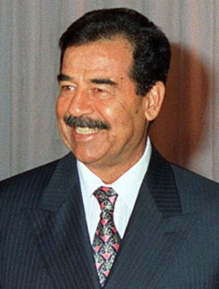
Saddam Hussein Abd al-Majid al-Tikriti was an Iraqi politician who served as the fifth president of Iraq from 16 July 1979 until 9 April 2003. A leading member of the revolutionary Arab Socialist Ba'ath Party, and later, the Baghdad-based Ba'ath Party and its regional organization, the Iraqi Ba'ath Party—which espoused Ba'athism, a mix of Arab nationalism and Arab socialism—Saddam played a key role in the 1968 coup that brought the party to power in Iraq.

Hussein bin Talal was King of Jordan from 11 August 1952 until his death in 1999. As a member of the Hashemite dynasty, the royal family of Jordan since 1921, Hussein was a 40th-generation direct descendant of Muhammad.

Abdullah II bin Al-Hussein is King of Jordan. He has been the king since ascending the throne on February 7, 1999. He is a member of the Hashemite dynasty, who have been the reigning royal family of Jordan since 1921, and is considered a 41st-generation direct descendant of Prophet Muhammad.
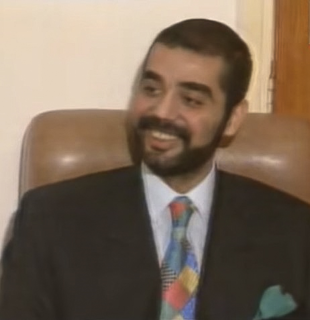
Uday Saddam Hussein was an Iraqi politician and the eldest son of Saddam Hussein. He held numerous positions as a sports chairman, military officer and businessman, and was the head of the Iraqi Olympic Committee and Iraq Football Association, and head of the Fedayeen Saddam.

Iraq under Saddam Hussein saw severe violations of human rights, which were considered to be among the worst in the world. Secret police, state terrorism, torture, mass murder, genocide, ethnic cleansing, rape, deportations, extrajudicial killings, forced disappearances, assassinations, chemical warfare, and the destruction of the Mesopotamian marshes were some of the methods Saddam and the country's Ba'athist government used to maintain control. The total number of deaths and disappearances related to repression during this period is unknown, but is estimated to be at least 250,000 to 290,000 according to Human Rights Watch, with the great majority of those occurring as a result of the Anfal genocide in 1988 and the suppression of the uprisings in Iraq in 1991. Human Rights Watch and Amnesty International issued regular reports of widespread imprisonment and torture.
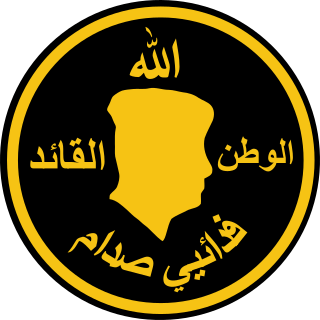
Fedayeen Saddam was a paramilitary organization loyal to the Ba'athist Iraqi government of Saddam Hussein. The name was chosen to mean "Saddam's Men of Sacrifice". At its height, the group had 30,000–40,000 members.

The Israel–Jordan peace treaty, sometimes referred to as the Wadi Araba Treaty, is an agreement that ended the state of war that has existed between the two countries since the 1948 Arab–Israeli War and established mutual diplomatic relations. In addition to establishing peace between the two countries, the treaty also settled land and water disputes, provided for broad cooperation in tourism and trade, and obligated both countries to prevent their territory being used as a staging ground for military strikes by a third country.
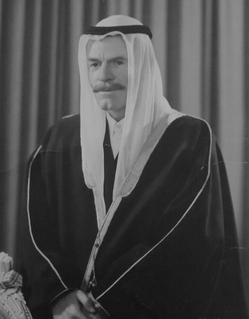
Izzat Ibrahim al-Douri was an Iraqi politician and Army Field Marshal. He served as Vice Chairman of the Iraqi Revolutionary Command Council until the 2003 U.S.-led invasion of Iraq and was regarded as the closest advisor and deputy under President Saddam Hussein. He led the Iraqi insurgent Naqshbandi Army.
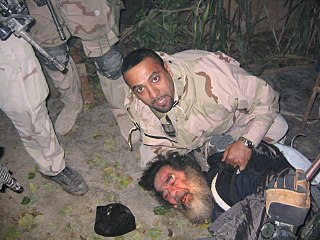
Operation Red Dawn was a military operation by the United States where Saddam Hussein, president of Iraq, was captured in the town of ad-Dawr, Iraq on 13 December 2003. It was named after the 1984 film Red Dawn. The mission was executed by joint operations Task Force 121—an elite and covert joint special operations team, supported by the 1st Brigade Combat Team of the 4th Infantry Division, commanded by Major General Raymond Odierno.

Raghad Saddam Hussein is an Iraqi exile and eldest daughter of Saddam Hussein.

Black September, also known as the Jordanian Civil War, was a conflict fought in the Hashemite Kingdom of Jordan between the Jordanian Armed Forces (JAF), under the leadership of King Hussein, and the Palestine Liberation Organisation (PLO), under the leadership of Yasser Arafat, primarily between 16 and 27 September 1970, with certain aspects of the conflict continuing until 17 July 1971.

Outlawz are an American hip hop group founded by rapper Tupac Shakur in late 1995 after Shakur's release from prison. Collectively, they were best known for their association with Shakur. Most of the group members are named after political figures.

Princess Haya bint Hussein is the daughter of King Hussein of Jordan and his third wife Queen Alia, and the half-sister of King Abdullah II.

Hussein bin Abdullah is Crown Prince of Jordan as the son of King Abdullah II. As a member of the Hashemite dynasty, the royal family of Jordan since 1921, he is a 42nd-generation direct descendant of Muhammad.

The execution of former Iraqi President Saddam Hussein took place on 30 December 2006. Saddam Hussein was sentenced to death by hanging, after being convicted of crimes against humanity by the Iraqi Special Tribunal for the Dujail massacre—the killing of 148 Iraqi Shi'ites in the town of Dujail—in 1982, in retaliation for an assassination attempt against him.

The Killing of Qusay and Uday Hussein occurred during an American military operation conducted on July 22, 2003, in the city of Mosul, Iraq. The operation – originally intended to apprehend Uday Hussein and Qusay Hussein, both sons of deposed Iraqi President Saddam Hussein – turned into a four-hour gun battle outside a fortified safehouse which ended with the death of both Hussein brothers, Qusay's son Mustafa, and a bodyguard, Abdul Samad al-Hadushi.
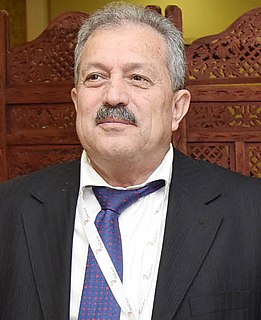
Hussein Arnous is a Syrian politician who has served as prime minister of Syria since 11 June 2020. Arnous's appointment was announced by state media shortly after it was reported that President Bashar al-Assad had fired previous prime minister Imad Khamis amid a worsening economic crisis.
Mohammad Samir Haddad is a Syrian politician from the Arab Democratic Union Party who served as Minister of State for Southern Development Affairs in the First Hussein Arnous government.
References
- ↑ "الحكومة الجديدة.. متوسط أعمارها نحو 58 عاماً.. ونسبة التغيير فيها 41 بالمئة ونسبة النساء 10 بالمئة - الوطن أون لاين". 2020-08-30. Archived from the original on 30 August 2020. Retrieved 2022-05-17.